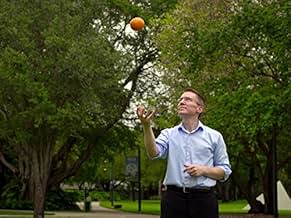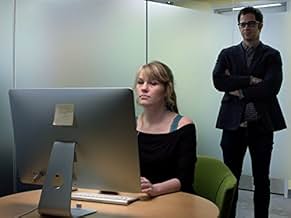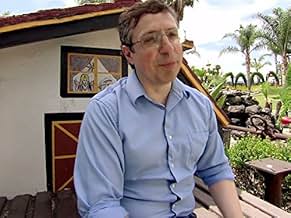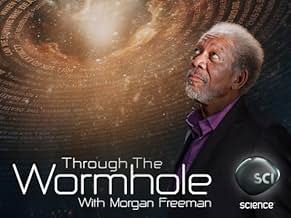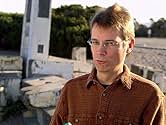IMDb RATING
8.6/10
19K
YOUR RATING
Morgan Freeman explores humanity's biggest questions: our composition, what preceded existence, if we're alone in the universe, and whether there's a creator - mysteries that have challenged... Read allMorgan Freeman explores humanity's biggest questions: our composition, what preceded existence, if we're alone in the universe, and whether there's a creator - mysteries that have challenged our greatest minds.Morgan Freeman explores humanity's biggest questions: our composition, what preceded existence, if we're alone in the universe, and whether there's a creator - mysteries that have challenged our greatest minds.
- Nominated for 2 Primetime Emmys
- 4 nominations total
Browse episodes
Summary
Reviewers say 'Through the Wormhole' is lauded for its exploration of advanced scientific theories and Morgan Freeman's narration. It delves into quantum mechanics, the multiverse, and consciousness. However, critics note a lack of skepticism, blending speculative theories with established science, and occasional pseudoscience. Some find it thought-provoking and educational, while others argue it oversimplifies complex topics and presents misleading information. The series is also critiqued for its approach to religious and philosophical questions, often merging science with spirituality.
Featured reviews
Through the Wormhole is an entertaining show about science. As host, Morgan Freeman asks questions and guides us through the possible answers. Topics can range from time travel, to (gasp!) theology and everything in between. There are times when the show can be a bit too speculative or pedantic, but overall it's a fun way to learn about what was, what is, or what might be. I especially enjoyed the shows explaining particle physics and Higgs-Boson in particular. The show does a great job making complex theories and concepts understandable. I applaud Mr. Freeman's efforts at making television a smarter place, and hope to enjoy more in the future.
What a brilliant mix, Morgan with his magic voice taking us on brilliant adventures in thought with science, history, art and philosophy.
Well done to the whole Through the Wormhole team on a fantastic series.
All ages need to watch this.
Well done to the whole Through the Wormhole team on a fantastic series.
All ages need to watch this.
I used to love this show. It revealed fascinating developments at the forefront of neuroscience, genetics, exobiology, and so forth.
It has degenerated to nearly useless. I shall provide an example drawn from this evening's new episode, "Do We Live in the Matrix?" whereby it is opined--and, ostensibly, justified--that we could very well be living in a computer simulation.
We meet a renowned Swiss AI expert. He tells us there's no need to express pi in so many zillions of digits that wrap around the globe ad infinitum: we can just put "C/d"--where, of course, C is circumference and d is diameter.
Uh . . . the difference is that the first one is practical (I can measure off 3.14159... inches.) The other is purely notational (I cannot measure off C/d inches.)
The same expert tells us that, "I can express the entire universe in ten lines of code," and beams with pride as he presents an extremely vague and general algorithm in an ALGOL-like PDL.
Uh . . . in a suitably high-level language, I can express the entire universe in ONE SYMBOL of code. SO WHAT: what PRACTICAL, IMPLEMENTABLE purpose is accomplished?
Another scientist shows some symmetric matrices to mathematicians without any commentary and is disappointed that they don't get excited. When he builds corresponding models of atomic structures, then everyone's excited.
Perhaps if he had TOLD them they were looking at symmetric spin tensors within a Lie algebra, they would have achieved a meaningful apotheosis. Instead, we hear snippets of some meaningless argument about bits and bytes and shmits.
(I recall from a previous episode--although it's in the same vein--that some physicist claimed that, if he builds such and such a fiber optic circuit, he can go backwards in time by 10 to the -18 seconds. I presume that even a physicist realizes that this is completely unmeasurable and thus unverifiable: sending the data from the measuring device to the managing computer takes literally billions of times longer than the 10 to the -18 seconds putatively recovered. I know, I know, physicists pooh-pooh anything that isn't physics as beneath them, but I don't think that's the issue here.)
I SEE WHAT THE PROBLEM IS HERE: the producers of the show have ZERO understanding of the concepts being discussed, Morgan Freeman's golden throat notwithstanding. This, combined with the PERPETUAL problem that participating experts in TV shows experience, viz., that pieces and snippets of their cogent essays are quoted out of context, results in a stream of meaningless dribble that endeavors to sound technical in its misapplied terminological splendor but ends up delivering just so much imbecility in sheep's clothing, albeit dressy and richly ornamented.
What a PROFOUND disappointment!
(FYI, the popular go-back-in-time theme is utterly impossible. This is trivially easy to demonstrate. Suppose I set a box on my kitchen table and send it into the past. IT WOULD HAVE BEEN THERE YESTERDAY! Case closed.)
It has degenerated to nearly useless. I shall provide an example drawn from this evening's new episode, "Do We Live in the Matrix?" whereby it is opined--and, ostensibly, justified--that we could very well be living in a computer simulation.
We meet a renowned Swiss AI expert. He tells us there's no need to express pi in so many zillions of digits that wrap around the globe ad infinitum: we can just put "C/d"--where, of course, C is circumference and d is diameter.
Uh . . . the difference is that the first one is practical (I can measure off 3.14159... inches.) The other is purely notational (I cannot measure off C/d inches.)
The same expert tells us that, "I can express the entire universe in ten lines of code," and beams with pride as he presents an extremely vague and general algorithm in an ALGOL-like PDL.
Uh . . . in a suitably high-level language, I can express the entire universe in ONE SYMBOL of code. SO WHAT: what PRACTICAL, IMPLEMENTABLE purpose is accomplished?
Another scientist shows some symmetric matrices to mathematicians without any commentary and is disappointed that they don't get excited. When he builds corresponding models of atomic structures, then everyone's excited.
Perhaps if he had TOLD them they were looking at symmetric spin tensors within a Lie algebra, they would have achieved a meaningful apotheosis. Instead, we hear snippets of some meaningless argument about bits and bytes and shmits.
(I recall from a previous episode--although it's in the same vein--that some physicist claimed that, if he builds such and such a fiber optic circuit, he can go backwards in time by 10 to the -18 seconds. I presume that even a physicist realizes that this is completely unmeasurable and thus unverifiable: sending the data from the measuring device to the managing computer takes literally billions of times longer than the 10 to the -18 seconds putatively recovered. I know, I know, physicists pooh-pooh anything that isn't physics as beneath them, but I don't think that's the issue here.)
I SEE WHAT THE PROBLEM IS HERE: the producers of the show have ZERO understanding of the concepts being discussed, Morgan Freeman's golden throat notwithstanding. This, combined with the PERPETUAL problem that participating experts in TV shows experience, viz., that pieces and snippets of their cogent essays are quoted out of context, results in a stream of meaningless dribble that endeavors to sound technical in its misapplied terminological splendor but ends up delivering just so much imbecility in sheep's clothing, albeit dressy and richly ornamented.
What a PROFOUND disappointment!
(FYI, the popular go-back-in-time theme is utterly impossible. This is trivially easy to demonstrate. Suppose I set a box on my kitchen table and send it into the past. IT WOULD HAVE BEEN THERE YESTERDAY! Case closed.)
WOW! I have watched every single episode. FINALLY a high quality scientific show that actually asks high quality questions and goes onto answer them! AMAZING! It has high quality footage, music, and they bring the top experts in whatever field they are discussing. They are not shy to discuss concepts that go beyond the norm and always push the envelope.
Highly recommended if you are bored with the current JUNK that is available. It will broaden your thinking and deepen your perspective on our everyday reality.
Some areas where they can improve is perhaps try not to be TOO neutral! A lot of times they briefly discuss a fantastic idea and not give it enough time to explain further. Thus leaving us with a sense of wanting more information, which i guess is a good thing because then we can go and find out more information on it.
Highly recommended if you are bored with the current JUNK that is available. It will broaden your thinking and deepen your perspective on our everyday reality.
Some areas where they can improve is perhaps try not to be TOO neutral! A lot of times they briefly discuss a fantastic idea and not give it enough time to explain further. Thus leaving us with a sense of wanting more information, which i guess is a good thing because then we can go and find out more information on it.
All series on the topic of astronomy and cosmology must and will be measured to that watershed event of the early eighties, "Cosmos" by Carl Sagan, which left me with clarity of what we knew, and the relevant questions yet to be answered at the time.
A magisterial Morgan Freeman guides each episode by asking fascinating and timely questions, then allowing experts to answer them.
The result feels too all-over-the-map, sometimes patronizingly simple, then suddenly, as if taken for granted, skipping over crucial logical stepping stones in the explanation process. "Through The Wormhole" suffers from too many people with different verbal styles (and varying verbal skills) to follow a coherent thread of an idea from beginning to end, the way Mr Sagan did so masterfully back in the day.
Then there's a certain something Discovery Channel Influence, with episodes titled along the lines of "Is There A God?", which Mr Sagan would have found sensationalistic. And I agree with Mr Sagan.
Bottom line: As a passionate follower of astronomy since the early eighties, I watch "Through The Wormhole", but in 2012 I prefer my astrophysics/cosmology shows hosted by Neil DeGrasse Tyson, or Brian Cox.
A magisterial Morgan Freeman guides each episode by asking fascinating and timely questions, then allowing experts to answer them.
The result feels too all-over-the-map, sometimes patronizingly simple, then suddenly, as if taken for granted, skipping over crucial logical stepping stones in the explanation process. "Through The Wormhole" suffers from too many people with different verbal styles (and varying verbal skills) to follow a coherent thread of an idea from beginning to end, the way Mr Sagan did so masterfully back in the day.
Then there's a certain something Discovery Channel Influence, with episodes titled along the lines of "Is There A God?", which Mr Sagan would have found sensationalistic. And I agree with Mr Sagan.
Bottom line: As a passionate follower of astronomy since the early eighties, I watch "Through The Wormhole", but in 2012 I prefer my astrophysics/cosmology shows hosted by Neil DeGrasse Tyson, or Brian Cox.
Did you know
- ConnectionsFeatured in Symphony of Science: The Quantum World (2011)
- How many seasons does Through the Wormhole have?Powered by Alexa
Details
- Release date
- Country of origin
- Official site
- Language
- Also known as
- Voyage dans l'espace-temps avec Morgan Freeman
- Filming locations
- Ventura, California, USA(Studio)
- Production companies
- See more company credits at IMDbPro
- Runtime
- 1h(60 min)
- Color
- Sound mix
- Aspect ratio
- 16:9 HD
Contribute to this page
Suggest an edit or add missing content





